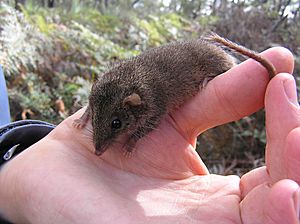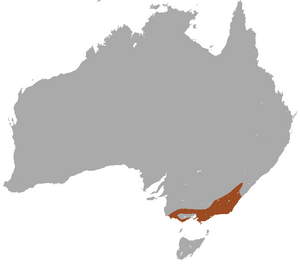Agile antechinus facts for kids
Quick facts for kids Agile antechinus |
|
|---|---|
 |
|
| Conservation status | |
| Scientific classification | |
| Genus: |
Antechinus
|
| Species: |
agilis
|
 |
|
| Agile antechinus range | |
The agile antechinus (Antechinus agilis) is a small, meat-eating marsupial. It belongs to the Dasyuridae family, which includes many Australian carnivorous marsupials. You can find this interesting animal in Australia.
Contents
Discovering the Agile Antechinus
For a long time, people thought the agile antechinus was just a type of brown antechinus (Antechinus stuartii). However, in 1980, scientists studied the genetic variation between them. This study showed that the agile antechinus was actually a different species. It was officially named and described in 1998.
What Makes Them Special?
Appearance and Diet
The agile antechinus looks very much like the brown antechinus. However, it is a little smaller. Its fur also has a slightly more greyish color. These small marsupials mostly eat invertebrates. Their favorite foods include beetles, spiders, and cockroaches. Sometimes, they might also eat small lizards or soft berries. If food becomes scarce, the agile antechinus can enter a state called torpor. This is like a deep sleep that helps them save energy.
Life Cycle and Breeding
Like all antechinuses, the agile antechinus has a very short breeding season. This period is intense and happens only once a year. After the breeding season, all the male antechinuses die. The females then carry their babies for about 27 days. This period is called gestation. After this, they give birth to their young. Sometimes, groups of up to 20 antechinuses have been seen nesting together.
Where They Live
Habitat and Location
The agile antechinus lives in wet or moist forests. You can find them in the southeastern part of Australia. They are quite common in these areas.
Threats and Conservation
Even though they are common, their numbers have gone down in some places. This is due to several reasons.
- Forests are being cleared for other uses.
- New plantations are being created.
- Trees are being harvested.
- Controlled burning practices affect their homes.
- New animals like the cat and the red fox have been introduced. These animals can hunt the antechinus.
Despite these challenges, there is no sign that the agile antechinus is currently in danger of disappearing.
Images for kids
-
From John Gould's Mammals of Australia
See also
 In Spanish: Antequino ágil para niños
In Spanish: Antequino ágil para niños





